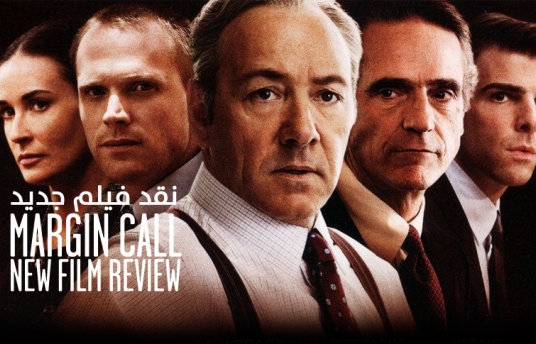DFI Film Review : Margin Call (2011)
Feb 14, 2011

Written by James Rawson, New Media, DFI
Director: J.C. Chandor
Genre: Thriller
Starring: Kevin Spacey, Jeremy Irons, Demi Moore, Stanley Tucci
It is 2008, and after 19 years of faithful service to one of Wall Street’s biggest financial giants, senior analyst Eric Dale (the always wonderful Stanley Tucci) has his contract terminated in the first wave of redundancies that foreshadow the enormous worldwide recession to come. As he is about to leave his office for the last time, he hands over an unfinished project to one of the company’s young number-crunchers, Peter Sullivan (Zachary Quinto), with the simple message: “Be careful”. Eric’s been running some data, forecasting risk assessments based on the company’s current assets, and they seem to involve an awful lot of graphs pointing downwards. Peter picks up the analysis where Eric left off and, before you can say toxic debt, he’s worked out what everyone else has failed to notice: the company is holding enough dodgy stocks to wipe it off the map. In the 11th hour a select group of key players are dragged out of their beds and into the boardroom to develop a strategy for saving the company, even if it means destroying the market. Executives Sam Rogers (Kevin Spacey) and Will Emerson (Paul Bettany) are joined by the ruthlessly ambitious broker Jared Cohen (Simon Baker), who is in direct competition with the film’s sole feisty female character Sarah Robertson (Demi Moore) to save his neck, all under the guidance of the seemingly amoral and rather incompetent CEO John Tuld (Jeremy Irons).
As the son of a Merrill Lynch banker, writer/director JC Chandor definitely knows his environment well, and while “Margin Call” may not always have you on the edge of your seat, the film succeeds in putting a human face to the hubris, greed and wilful ignorance that led these institutions, and by association the whole world’s economy, into the proverbial red.
In “Margin Call”, and one fears real life, the higher up and more powerful the characters become, the more ignorant they seem to be of the financial system that facilitates their opulent lifestyles. Jeremy Irons gets one of the best lines in the film when his CEO character asks Sullivan, an entry level analyst, to explain the mathematical model “as you might to a small child or a golden retriever”. We later find out that this is a man who makes in excess of 80 million US dollars a year. Five years ago that line would have seemed implausible, but now it doesn’t seem quite so farfetched.
Unfortunately for “Margin Call”, we all know exactly where the story is going, because we all saw it unfold in front our eyes, and this is an obstacle that the film never quite overcomes. The script should expose the raw power dynamics of the ultra-masculine business world as heads roll, scapegoats are made and only the most cutthroat survive, but without the edge or sharp wit of Aaron Sorkin’s “The Social Network”, or David Mamet’s “Glenngarry Glenn Ross”, the characters often feel like they’re just shouting at each other to pass the time before the inevitable happens.
With a stellar cast and some slick direction, “Margin Call” is never anything less than watchable, but there is a definitely a better drama to come out of this recession. Assuming they can get the financing sorted, of course.